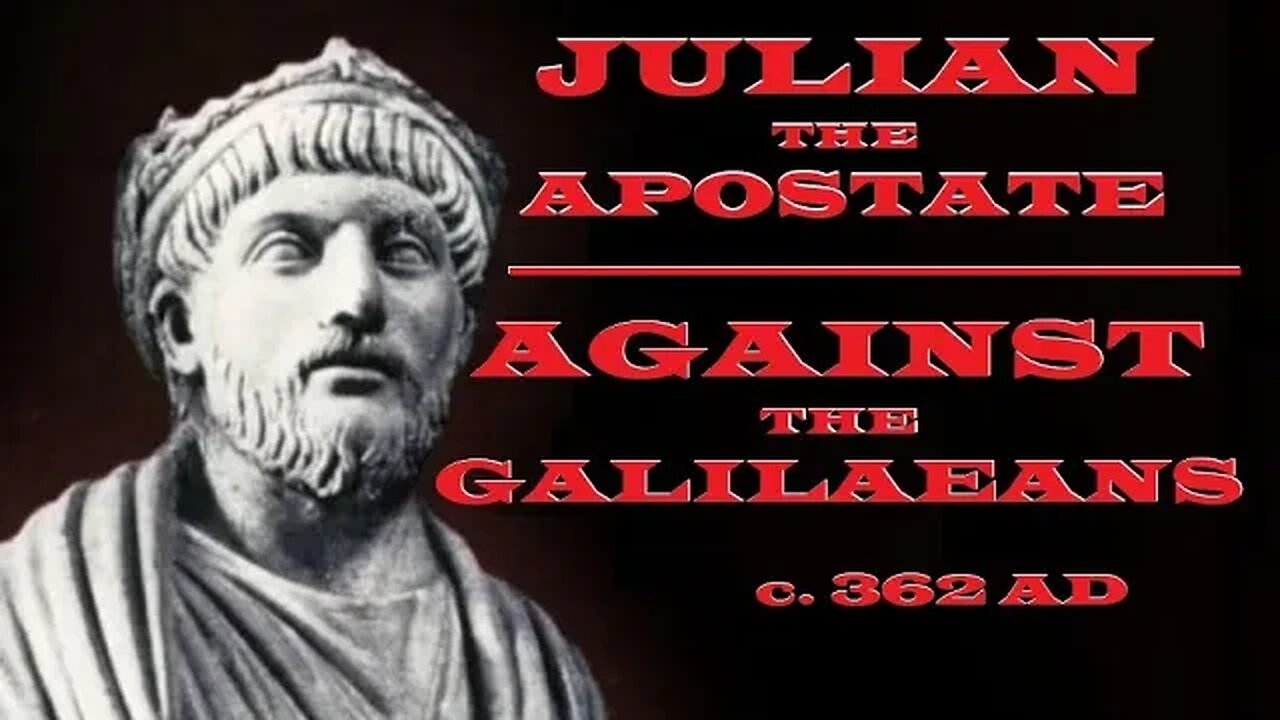Premium Only Content

Julian the Apostate - Against the Galileans - c. 362 AD
Against the Galileans, meaning against Christians, (Greek: Κατὰ Γαλιλαίων; Latin: Contra Galilaeos) was a Greek polemical essay written by the Roman emperor Julian, commonly known as Julian the Apostate, during his short reign. Despite having been originally written in Greek, it is better known under its Latin name, probably due to its extensive reference in the polemical response Contra Julianum by Cyril of Alexandria.
(remains of the 3 books, excerpted from Cyril of Alexandria, Contra Julianum (1923) pp.319-433 and other fragments)
FL.CL.IVLIANVS.P.F.AVG - "Julian " -
Flavius Claudius Julianus; / Ἰουλιανός / Ioulianos; ( b. 331 – d. 26 June 363 ) was Roman emperor from 361 to 363, as well as a notable philosopher and author in Greek. Julian is traditionally called Julian the Apostate due to his policy of reversing Emperor Constantine's Christianization campaign by restoring traditional religious practices and holy places across the Empire. Julian so despised the Christian faith that he even attempted to reverse his baptism by bathing in a bull’s blood. One ecclesiastical historian describes him as a man “who had made his soul a home of destroying demons.”
Julian, wishing to falsify the predictions of Daniel and of Jesus Christ, attempted to rebuild the temple. For this purpose, he assembled the chief among the Jews, and asking them why they neglected the prescribed sacrifices, was answered, that they could not offer any where else but in the temple of Jerusalem. Upon this he ordered them to repair to Jerusalem, to rebuild their temple, and restore their ancient worship, promising them his concurrence in carrying on the work. This filled the Jews with inexpressible joy. Hence flocking to Jerusalem, they began with scorn and triumph to insult over the Christians.
The emperor opened his treasures to furnish every thing necessary for the building. The most able workmen were convened from all parts; persons of the greatest distinction were appointed to direct the work; and the emperor's friend, Alipius, was set over the whole, with orders to carry on the work without ceasing, and to spare no expense.
Many thousands were employed. But what they had thrown up in the day, was, by repeated earthquakes, the night following cast back again into the trench. When Alipius the next day was earnestly pressing on the work, with the assistance of the governor of the province, there issued, says Ammianus Marcellinus, such horrible balls of fire out of the earth near the foundations, as to render the place inaccessible from time to time to the scorched workmen. And the victorious element continuing in this manner obstinately bent, as it were, to drive them to a distance, Alipius, thought proper to abandon, though reluctantly, the enterprise. This great event happened in the beginning of the year 363, and with many very astonishing circumstances is recorded both by Jews and Christians."
Gregory of Nazianzus, orat. ii. cont. Julianum; Theodoret, lib. iii. Histor. chap. xx.
-
 LIVE
LIVE
The Rubin Report
1 hour agoCongress Sits in Stunned Silence After RFK Jr.’s Brutal Fact-Based Wake-Up Call
3,065 watching -
 LIVE
LIVE
LFA TV
15 hours agoNOMINEES ASSEMBLE! | LIVE FROM AMERICA 1.30.25 11AM
3,655 watching -
 LIVE
LIVE
Bannons War Room
9 hours agoFBI Director Nominee Kash Patel Testifies at Confirmation Hearing
13,377 watching -
 LIVE
LIVE
Benny Johnson
2 hours ago🚨PANIC: Kash Patel FBI Director Confirmation Hearing LIVE Right NOW | Deep State on Life Support
27,733 watching -
 DVR
DVR
Rethinking the Dollar
51 minutes agoThursday Morning Check-In: Trump Plays Blame Game, Fed Pauses and Metals Respond
-
 LIVE
LIVE
Matt Kohrs
11 hours agoMarket Open: New Highs Incoming! (META, NVDA & TSLA) || The MK Show
803 watching -
 DVR
DVR
Man in America
2 hours ago🚨 RED ALERT: Did Trump Just BREAK the Bank of England? This Could be HUGE!
1.42K2 -
 43:25
43:25
BonginoReport
5 hours agoRFK Jr. Goes To War With Big Pharma (Ep.129) - 01/30/2025
61.1K56 -
 1:25:26
1:25:26
Graham Allen
3 hours agoHelicopter CRASHES into plane over DC! + RFK Hearing Gets INTENSE And META To Pay Trump $25M!
37.3K27 -

Randi Hipper
1 hour agoFrom Regulation to Integration: Powell Allows Banks to Embrace Crypto
5.28K